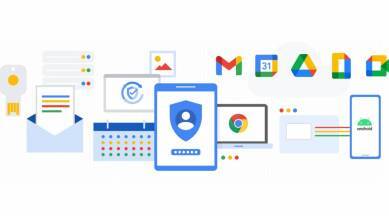Google has made a slew of announcements focused on its Cloud services at its annual ‘Next’ conference, which focuses on the company’s enterprise side of the business.
Google announced more security features for its Workspace ahead of the Next conference. Google has made a slew of announcements focused on its Cloud services ahead of its annual ‘Next’ conference, which takes place later today. At Next, this time, the focus is on better security in its Workspace platform, a new Google Distributed Cloud platform for enterprise customers, and sustainability and carbon footprint reporting for cloud customers.
Workspace is Google’s suite of offerings which includes email and other services. Earlier, Google had announced the availability of client-side encryption (CSE) in beta for Drive, Docs, Sheets, and Slides on Workspace. It is now bringing this feature to Google Meet, which is the company’s video calling tool.
According to a blogpost, CSE will give Google’s enterprise customers “complete control over encryption keys while helping them meet data sovereignty and compliance requirements.” Though the feature is in beta, it will let Google enterprise customers manage their encryption keys without the need for a third partner.
Other features, which focus on security in Google Workplace are the addition of data loss prevention (DLP) for Chat, though this is also in beta for now. Google says this will help clients “protect their sensitive data and information from getting into the wrong hands, without impacting the end-user experience.” IT departments will be able to ensure that sensitive and confidential information does not leave the official Chat with this feature.
Further, Google is adding Drive labels in Workspace, where organisations will now be able to classify files stored in Drive based on their sensitivity level. These labels integrate with Google Workspace Data Loss Prevention and thus make it easier to ensure that there is no external sharing, downloading, and printing of sensitive files.
Google is also adding more safeguards against dangerous or suspicious files. It will now display a warning to enterprise users to help protect them and their organisation from malware, phishing, and ransomware. This functionality is being made available in Google Docs and will be rolling out soon for Google Sheets and Slides, according to the blog post.
The company also announced the launch of a Google Cybersecurity Action Team (GCAT), which it says is made up of cybersecurity experts from across the company. This will function as a premier security advisory team to support clients such as governments, those in critical infrastructure, big enterprises, and even small businesses. It will provide advisory services, trust, and compliance services, and deliver customer security and solutions engineering to Google’s enterprise customers. It will also provide threat intelligence and incident response services to clients.
Further, as part of its efforts on sustainability, Google Cloud will now provide Carbon Footprint reporting for every Cloud Platform customer. The Google Earth Engine will become available for select enterprise customers, and this is aimed at helping them using satellite imagery plus AI to “decarbonise their operations.”
Google also announced its Distributed Cloud, which is “a portfolio of hardware and software solutions” that extend the company’s Cloud’s infrastructure and services to edge locations as well as customer data centers, which have an Anthos-managed control plane. (Anthos is a Google-provided open-source control plane for managing on cloud applications).
As part of the Distributed Cloud platform, Google will let customers access edge locations, which can ensure lower latency for customers. Google says it will “support customer-owned edge or remote locations such as retail stores, factory floors, or branch offices,” as well with the Distributed Cloud platform, where clients might require localised compute and processing.
This is a fully managed product that brings Google Cloud’s infrastructure and services closer to where a client’s data is being generated and consumed, according to the company.
Meanwhile, Google Distributed Cloud Hosted is designed to run sensitive workloads and is meant to support public-sector customers and commercial entities that have strict data residency, security, or privacy requirements. It does not require connectivity to Google Cloud at any time to manage infrastructure, services, APIs, or tooling, the company said




